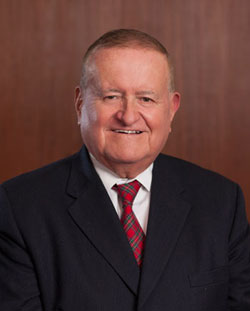December 2017 • Volume 105 • Number 12 • Page 8
Thank you for viewing this Illinois Bar Journal article. Please join the ISBA to access all of our IBJ articles and archives.
President's Page
ISBA Joins the Effort to Stem Gun Violence
A 16-member ISBA committee will convene stakeholders and promote community planning to address the scourge of gun violence statewide.

Are we finally making some progress in Chicago in reducing gun violence? It has been reported that there are fewer gunshot victims now than last year at this time. While that's a welcome development, it's not cause to celebrate.
Communities across the state are struggling with gun violence. Little media attention is paid to the statewide nature of this problem or to the importance of using data collection and analysis to help identify the strategies that work so we can replicate them.
As president of a statewide bar association, I think our member judges and lawyers are key stakeholders who are uniquely positioned to effectively lead a collaborative conversation about this issue at the local level. To that end, I have appointed a 16-person committee to work on this.
Our focus is to help where we live and practice. Local communities are more thoughtful and nuanced about what is happening in their own neighborhoods than anyone else.
Judges, prosecutors, lawyers, and others in the criminal justice system are key stakeholders, but it is sometimes difficult to see the bigger picture beyond the individual cases that flow through the system. There is a significant body of useful research, and there are successful model programs that I believe can be replicated to address violence in any community.
The ISBA committee will work collaboratively with the statewide network of experts to bring the research and the implementation lessons learned to the ISBA's convening of key stakeholders. The goal is to facilitate dialogue and support multi-disciplinary, community-centric strategic planning to implement effective programs in Illinois. We hope to do the following:
1. Focus on data and evidence-based approaches to gun violence prevention and share program models with a track record of success;
2. Bring in experts in the field;
3. Assemble quality program materials;
4. Design an interactive program model to ensure active participation; and
5. Finally, publish a report directed at our members that will concentrate on how any community can host an evidence-based collaboration and identify the interventions that match their needs.
I have learned a great deal since this committee began its work, and I believe these kinds of conversations can have a significant impact on the quality of justice delivered to the local community. I have also learned that the legal community and its leaders can be slow to come to the table because they don't have all the evidence they need. After all, we are a profession driven by the presentation of evidence and the application of the law to the facts. I believe ISBA can use this educational approach to put evidence and facts to good use developing real solutions to the issue of gun violence.
Lawyers have historically provided pro bono services to those who need legal help but can't pay for it. We have been encouraged by the subject-matter experts whom we have consulted to consider providing pro bono help to victims and their families who are often puzzled or frightened, or both, by the legal system.
We have heard a disturbing counter-narrative to the story that victims will not talk to police, which is that victims bring information or evidence to police departments and never hear back. If that evidence was brought with the aid of an attorney who is then willing to follow up, we could have a direct impact on the abysmally low clearance rates for gun crimes. In addition, communities who suffer from gun violence have legal needs ranging from assistance with housing to re-entry efforts such as expungement.
As with any complex issue, there are no simple answers. Problem solving will require engaging key stakeholders in thoughtful, continuing community-based dialogue and data-driven analysis. Program models with demonstrated effectiveness will need to be implemented and evaluated until measurable positive impact is achieved. We ask for the support and involvement of our judge and lawyer members in this important work.

